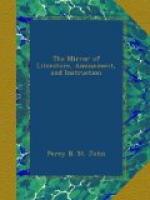At the town of Pezenas they still show an elbow-chair of Moliere’s (as at Montpelier they show the gown of Rabelais,) in which the poet, it is said, ensconced in a corner of a barber’s shop, would sit for the hour together, silently watching the air, gestures, and grimaces of the village politicians, who, in those days, before coffee-houses were introduced into France, used to congregate in this place of resort. The fruits of this study may be easily discerned in those original draughts of character from the middling and lower classes with which his pieces everywhere abound.
Moliere’s celebrated farce of Les Precieuses Ridicules; a piece in only one act, but which, by its inimitable satire, effected such a revolution in the literary taste of his countrymen, as has been accomplished by few works of a more imposing form—may be considered as the basis of the dramatic glory of Moliere, and the dawn of good comedy in France. The satire aimed at a coterie of wits who set themselves up as arbiters of taste and fashion, and was welcomed with enthusiastic applause, most of them being present at the first exhibition, to behold the fine fabric, which they had been so painfully constructing, brought to the ground by a single blow. “And these follies,” said Menage to Chapelin, “which you and I see so finely criticised here, are what we have been so long admiring. We must go home and burn our idols.” “Courage, Moliere,” cried an old man from the pit; “this is genuine comedy.” The price of the seats was doubled from the time of the second representation. Nor were the effects of the satire merely transitory. It converted an epithet of praise into one of reproach; and a femme precieuse, a style precieux, a ton precieux, once so much admired, have ever since been used only to signify the most ridiculous affectation. There was, in truth, however, quite as much luck as merit, in this success of Moliere; whose production exhibits no finer raillery, or better sustained dialogue, than are to be found in many of his subsequent pieces. It assured him, however, of his own strength, and disclosed to him the mode in which he should best hit the popular taste. “I have no occasion to study Plautus or Terence any longer,” said he, “I must henceforth, study the world.” The world accordingly was his study; and the exquisite models of character which it furnished him, will last as long as it shall endure.
Though an habitual valetudinarian, Moliere relied almost wholly on the temperance of his diet for the reestablishment of his health. “What use do you make of your physician?” said the king to him one day. “We chat together, Sire,” said the poet. “He gives me his prescriptions; I never follow them; and so I get well.”




